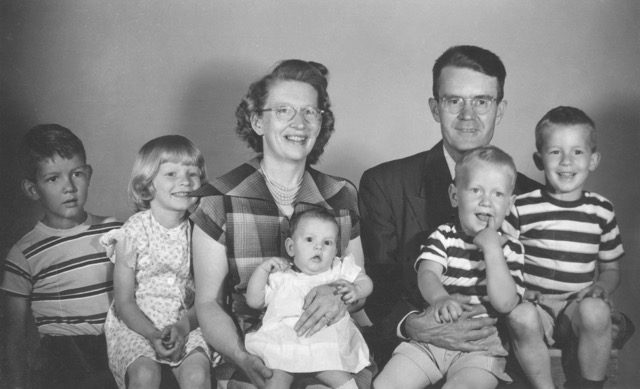I’m the baby here – three more children came along after me.
April 10 is National Siblings Day, a day to remember and celebrate our brothers and sisters, which I also address in my brand new YouTube video.
I am child number five of eight in my family.
We all grew up with doggedly determined Mennonite missionary parents, who devoted their lives to treating the poor, the sick, and those with leperosy in Paraguay, South America.
I used to have negative feelings about all of my older siblings. The truth is, I don’t remember much about them during my childhood, except that the three oldest treated me like an annoying non-entity, and I fought incessantly with the one closest to my age.
I wonder how those early sibling relationships influenced our lives? To find out, I did a bit of research.
Although siblings are a fixture of family life for most, sibling relationships have been relatively neglected by family scholars. For example, a 2012 article reviewing the 1990 – 2011 psychological and sociological research literature on “sibling and relation or relationships,” found only 741 citations. In contrast, in similar literature reviews, the counts were 33,990 citations for “parent or parenting,” 8,685 citations for “marriage or marital relationship or marital relation,” and 5,059 citations for “peer relations or peer relationships or friend-ships.”
The studies that do exist provide overwhelming evidence that younger siblings are more likely to be influenced – positively or negatively – by older siblings than by their parents. Unhealthy and toxic sibling relationships are often foundationally devastating and destabilizing.
Hmmm.
To add to that, my younger sister, who’s now a therapist, says we behaved like an alcoholic family. No, there was no alcohol in our home. We were good Mennonites, after all, and missionaries!
But we exhibited many of the characteristics of an alcoholic family: relatively low levels of family cohesion and emotional vulnerability or expressiveness, and high levels of conflict and unpredictable chaos compared with non-alcoholic families.
Of course, each of us kids adopted different coping strategies, and they fit well with what researchers have documented about the roles of alcoholic family members. One of us was the enabler, denying that anything was out of the ordinary in our dysfunctional family; another was the hero, who tried to bring normalcy to the family through his own achievements; the mascot attempted to deflect the family stress by supplying humor; the lost child became invisible; and the scapegoat offered the family a sense of normalcy by providing someone else to blame for its dysfunction.
If any of my siblings are reading this, they will recognize the role they played in our family. For purposes of this brief article, who played what role is unimportant. It is significant that we all played our roles, and that we influenced each other’s lives in important ways.
I have written about our family dynamics in my recent memoir Nothing Bad Between Us: A Mennonite Missionary’s Daughter Finds Healing in Her Brokenness. And in my new YouTube channel, Becoming Who We Truly Are, I explore ways to heal and become our best selves, despite early life challenges.
Fortunately, some healing has occurred. All of my siblings and I have established somewhat cordial and considerate relationships with one another as adults. A few of us have even become friends.
But I continue to have ambivalent feelings about some of my older siblings. Maybe I always will. On this day of remembrance, I open myself up to the continued challenge of forgiving my own shortcomings as a sister and forgiving the failings of my older siblings.
For me, this National Siblings Day is a day of remembrance and celebration, yes. But most important, it is a day of forgiveness, another step toward becoming who I truly am.

